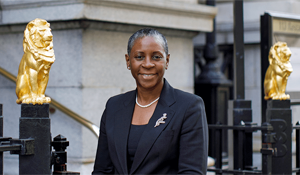Nick Emmerson is the deputy-vice president of the Law Society of England and Wales, and he will become vice-president in October 2022 and the 179th president in October 2023. Nick is a partner at Lewis Mathys Emmerson LLP and a specialist in cross-border mergers and acquisitions, and international capital market transactions. Nick is a past president of Leeds Law Society, which hosted its ground-breaking inaugural online Diversity and Inclusion Conference in September 2020 with support from the Law Society, followed by a second the following year.

“When people know they have to deliberate with others who have different experiences and mindsets to them, they are more likely to strive to be objective, frame arguments and consider issues more carefully.”
Crossing borders
I was educated at state primary and secondary schools in North Yorkshire. I then achieved a BA (Hons) in Politics and East Asian Studies at Newcastle University, which was a four-year degree with a third year at a university in Japan.
On graduation, I took a year out in Japan teaching English at state primary schools before studying the CPE and LPC at the College of Law in York. Subsequently, I became a trainee Solicitor at Denton Hall in London (second seat as a trainee in Tokyo) and on qualification spent two and a half years on an in-house secondment to a Japanese trading company in Tokyo.
I was a founding member of Herbert Smith Freehills’ Tokyo office and then returned to the London office. I then moved to Eversheds in Leeds where I made partner and became a founding partner of Eversheds’ Hong Kong office. I also managed the Shanghai office and then returned to the London office.
I then moved to Gateley in Leeds where I established the Leeds Corporate Team. Now I have my own firm, Lewis Mathys Emmerson LLP.
Supporting the solicitors’ profession
The Law Society’s deputy vice president (DVP) is basically a one-day-a-week role, but some weeks it’s more and some it’s less. I support the president and the vice president, which means I work closely with them and usually get the jobs that they cannot do due to schedule clashes. The president, vice president and deputy vice president are the Law Society’s main ambassadors, representing the organisation at home and abroad.
The DVP role easily fits around my day job as a lot of what I do is online, although I do enjoy the personal events such as hosting admissions ceremonies for newly-qualified solicitors.
Working beyond the bubble
Working with fellow solicitors at local law societies and at the Law Society of England and Wales allows you to puncture your firm bubble and meet solicitors from every part of the profession.
While I was president of Leeds Law Society, during the pandemic, I was able to bring Leeds Law Society and the Law Society together to host an online diversity and inclusion (D&I) conference that brought D&I champions together over several sessions to share their personal experiences and challenges.
It opened my eyes (wide) and made me appreciate what fellow solicitors have to do, not only to become solicitors, but to also just perform their day jobs and live their lives, especially when gender, mental well-being, race and ethnicity, social mobility, sexual orientation and disability challenges feature. All were covered at the D&I conference.
Diverse minds = diverse solutions
Evidence shows that having teams made up of people with the right capabilities, diverse perspectives and inclusive behaviours leads to better problem-solving.
Having talented individuals from diverse backgrounds also means our solicitors better represent society and by extension, their clients, which is vitally important for a profession that is responsible for upholding the Rule of Law and ensuring access to justice for everyone. The key principles of the Rule of Law include:
- Laws should apply equally to all, including government and private and public organisations;
- The law must be accessible, intelligible, clear and predictable;
- The law must adequately protect fundamental human rights and more.
When there’s diversity in a team there will be different ways of viewing a problem and a broader range of knowledge will be brought to the table. Diversity on its own is not enough though. There won’t be better problem-solving if people are reticent about speaking up and sharing their ideas because they fear they may not be welcomed or people will view them negatively. This is where inclusion comes in.
There needs to be an inclusive culture where individuals actively listen to each other, take time to see things from different perspectives, and collaborate.
Diversity and inclusion also help prevent bias and group-think. When people know they have to deliberate with others who have different experiences and mindsets to them, they are more likely to strive to be objective, frame arguments and consider issues more carefully.
Delivering better solutions will lead to better care for all clients, but there’s also the obvious point that a diverse profession is likely to understand the needs of a diverse client base better than one which is dominated by a narrow section of society.
Progress but still more to be done

There are some areas where we still need to do better too in terms of overall representation, for example, disabled people remain under-represented, as are those from lower socio-economic or non-professional backgrounds.
The most progressive firms are committed to making progress, with an ever-growing number setting targets for recruitment, retention and representation at senior levels, adopting contextual recruitment practices, and taking steps to make everyone feel included by supporting the creation of staff networks, adopting reverse mentoring for senior staff, and creating visible champions at board level, to name just a few things.
Law Society inclusion at work
At the Law Society, we undertake a range of activities, from supporting research on the current state of diversity and inclusion and what is likely to help make progress (see our recent gender pay gap, Race for Inclusion, Legally Disabled or Pride in the Law research) and providing good practice guidance to member firms and organisations, to running divisions for individual lawyers with different characteristics and supporting schemes that help overcome barriers to entry, retention and progression.
For example, our Diversity Access Scheme aims to help improve social mobility by supporting people who face exceptional social, educational, financial or personal obstacles to qualify as a solicitor. Since 2005, it has supported more than 260 talented awardees to pursue their career ambitions.
This year, we joined 90 other legal and compliance firms taking part in the #10000BlackInterns programme. We are hosting five interns and their six-week paid internship sees them working across our legal services, legal policy and people and organisational development teams.
We also offer a range of support through our Recharge programme for those considering returning to the law after a career break, including live webinars, virtual coaching, peer-to-peer support and refresher training, which many women returners have benefited from.
Being a male ally of gender balance working alongside two female pioneers

I’ve always worked for and alongside women throughout my career and I currently work alongside our first Black Law Society president, Stephanie Boyce, and our vice president, Lubna Shuja. Both are women and both inspire the next generation of non-traditional background solicitors. I look forward to continuing being a male ally as they impact our profession.
In October, I take over the vice presidency and will work alongside Lubna when she becomes our first Asian president of the Law Society. It is an historic time to be at the Law Society and being able to see our current and next president in action is a privilege.
I’ve learnt a lot and will continue to do so. My year as president sees the Law Society enter its 200th anniversary year, so celebrating gender balance and inclusion will definitely be at the heart of all we will be doing. Watch this space..!





